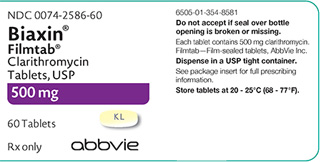Bacterial infection? In many cases, Biaxin is a lifesaver for bronchitis or pneumonia. It is a macrolide antibiotic and works by blocking the growth of bacteria. In the following, we will explain all the properties of Biaxin, as well as who can use it and when it is best to refrain from using it.
If you are already familiar with the effects of the drug and need a new portion of the drug, then to buy it on our site, just fill out the online order form and after a couple of days you will receive it in any region of the country, at the post office or directly at home. We remind you of the advantages of buying in our online pharmacy: favorable price, fast delivery, anonymity, possibility to buy the drug without prescription and without leaving home.
What is Biaxin and why is it used?
The antibiotic Biaxin, whose active ingredient is clarithromycin, can help treat a wide range of bacterial infections. It is often used in combination with anti-ulcer drugs to treat certain types of stomach ulcers. It may also be used to prevent some bacterial infections. To determine if it is suitable for the treatment of your particular condition, it is advisable to undergo an antibiogram before starting treatment.
What Are The Indications For Biaxin?
Biaxin has a wide range of uses, making it suitable for various infectious diseases. Some of the other groups are:
- Lower respiratory tract infections (bronchitis, pneumonia);
- Upper respiratory tract infections (pharyngitis, sinusitis);
- Skin and soft tissue infections (folliculitis, inflammation of subcutaneous tissue, rust);
- odontogenic infections (group of diseases of infectious and inflammatory nature caused by untimely treatment of caries, pulpitis, periodontitis, affecting the jaw bones, adjacent soft tissues and cellular spaces, regional lymph nodes); disseminated mycobacterial infections (mycobacterial infections of the jaw, adjacent soft tissues and cellular spaces, regional lymph nodes)
- disseminated or localised mycobacterial infections caused by Mycobacterium avium and Mycobacterium intracellulare.
Biaxin is also effective in eliminating Helicobacter pylori and reducing the recurrence rate of duodenal ulcers.
Are There Any Contraindications To The Use Of Biaxin?
Yes, like all medicines, Biaxin has clear contraindications. These include hypersensitivity to clarithromycin or any of the ingredients, renal or hepatic impairment, hypokalaemia, galactose intolerance, lactase or glucose or galactose malabsorption, pregnancy and lactation.
Biaxin should not be taken concomitantly with the following medicines: cisapride, pimozide, astemizole, terfenadine, ergotamine, ticagrelor, ranolazine or dihydroergotamine due to the risk of possible serious effects.
We strongly recommend that you consult your doctor before starting treatment and that you inform him/her of all medical conditions and medications you are taking.
Side effects of Biaxin
The most common side effects are abdominal pain, diarrhoea, nausea, vomiting and taste disturbance.
Allergic reactions and side effects occasionally occur in the nervous system, digestive system, urinary system, sense organs, respiratory system, skin and musculoskeletal system.
Instructions for use and dosage
The tablets should be taken orally with as much liquid as necessary and independently of meals.
Always consult your doctor before use. A dose different from the one indicated below may be necessary. Undertreatment may lead to recurrence of infection.
The recommended dose for adults and children over 12 years of age is usually 250 mg every 12 hours; for more severe infections, the dose may be increased to 500 mg every 12 hours.
The usual duration of treatment depends on the severity of the infection and varies between 6 and 14 days.


